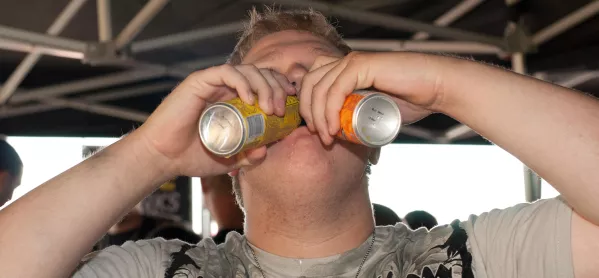Today, the government has launched a public consultation on its plans to make it illegal to sell energy drinks to children.
In January, leader Louise Martin made her case for why the drinks should have age restrictions placed on them in Tes.
Adrienne Rich said: “Language is power...Language can be used as a means of changing reality.”
Language is synonymous with all that we experience. Boost, Emerge, Rockstar, Amp, POWER(ade), Monster... words not too far out of place in a piece of key stage 2-3 descriptive writing. These words are infamous to our students across the country, not as sturdy tools of language but as the names of their favourite energy drinks. “Legal highs” readily available to our students that have up to 80mg of caffeine per 250ml: translated, that’s three cups of coffee. These beverages are having a detrimental effect on the long-term health of our students and - as a teaching profession - we need to get behind #NotforChildren and ban the sale of energy drinks to under-16s.
Why are our students consuming these highly caffeinated beverages like there is no tomorrow? Well, they’re cheap, often cheaper than water: check out the recent research by Fuse, the Centre for Translational Research in Public Health, who found that energy drinks were as cheap as 25p, with children as young as 10 reportedly buying them to “fit in” or “look tough”. That’s the equivalent of a 10-year-old drinking three cups of coffee in one sitting. It’s truly unbelievable. These drinks also offer an immediate “hit” and are readily available in supermarkets and corner shops across the country. Children of any age can go into a shop, purchase and gulp down with no questions asked, suffering miserable side effects such as headaches and heart palpitations.
Banned energy drinks
I work as a senior leader at Harris Academy South Norwood and like an increasing number of schools across the UK, we have successfully banned energy drinks. Seven of our students recently took part in a televised programme with Jamie Oliver and Jimmy Doherty and shared candid perspectives on the impact of these drinks, not to mention staff viewpoints alike. These are talented young adults addicted to them. The drinks affect their concentration, their eating habits, sleep and mood - let alone what they do to their bodies.
What’s important to our work at is the re-education of why these products are so dangerous. Don’t just ban them: teach the children their effects. Dr Nerina Ramlakhan, who also took part in the programme, addressed the impact that these drinks have on disrupting sleep and mood cycles - and this has proven a valuable tool to share with our students. Her work has also formed a recent school-based study by PGCE colleagues from the Institute of Education and we look forward to sharing these findings with our school. Our students are seeing the benefits of our decision to rid the school of these drinks daily.
But banning the drinks in schools is only the tip of the iceberg. A study commissioned by the Scottish government found that four in 10 children aged 13-15 buy a sugary drink, including fizzy drinks and energy drinks, when they are off school grounds, despite a ban while on-site. I’m pretty confident that most of us don’t crack open an energy drink at the breakfast table, so neither should our students on their way to and from school.
Fellow educators, support the campaign to remove these vile products from our shelves. Put an age-restricted ban on them, because they are #NotforChildren and not good enough for our schools.
Louise Martin is the assistant principal at the Harris Academy in South Norwood and tweets @louise_a_martin
